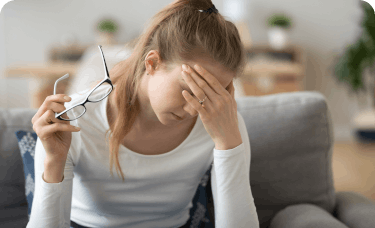Gaming headaches

You are about to leave Excedrin.com.
Clicking on this link means that you have chosen to leave our website. While we believe that the website which you have selected to visit may be of interest to you, it is an independent web site which is not under our control. As a result, we do not endorse its content and we have no responsibility for its content or privacy practices.
If you do not wish to leave this site, click Cancel.
Or, click OK to continue.
Approximately 70% of children have experienced some degree of headache by the age of 15. The stresses of adolescence, such as peer pressure, developing sexuality, and conflicts with parents, are known contributors to headache development. The typical lifestyle of an adolescent, including irregular eating and sleeping habits, may also trigger headaches. In some young women, the onset of their menstrual cycle may be linked with the onset of headaches. To help your child deal with headaches, try to remove triggering factors where possible, encourage relaxation techniques or biofeedback, while providing comfort and counsel.
Occasional use of over-the-counter pain relievers may also be appropriate, but remember to exercise caution when using medications containing aspirin for children under the age of 15 due to the risk of Reye's syndrome. It is important to know when to seek medical attention, especially with young children. Some symptoms to be aware of are headaches accompanied by fever, drowsiness, rash, or vomiting, and those after head trauma. See a doctor when treating a child with a pain reliever for headache. See the dosing guidelines on the packaging of OTC medication to confirm the appropriate age range for use and dose.
Definitely. Many people get headaches or make their headaches worse because of poor posture. If you hold your head up in proper alignment with your body, there's less strain on your muscles. But if it is held forward of its proper position, it places strain on the muscles of the neck and upper back.
Certain positions can lead to muscle strain and headache if they're held for a time. If you hold a particular position such as bending over a typewriter, holding the phone between your shoulder and your head, or doing any type of repetitive movement, you could be vulnerable to headache. One way to counteract these stresses is to change position frequently. Every 45 minutes or so, give yourself a three to five minute "break." Get up from your desk and walk to the copy machine or do some filing, anything as long as you change positions.
There could be. Headache activity is influenced by fluctuations in the menstrual-related hormones, particularly estrogen and progesterone. This can lead to headaches around the time of menstruation or mid-cycle, during ovulation. Premenstrual headaches, which may strike as migraines or tension-type, afflict 10 million American women.
Yes. Eyestrain headaches may be caused by reading in poor light or reading for long periods without a break. Technically, it's not your eyes you are straining but the muscles around them, which are used for squinting, blinking, or reacting to a glare or dim light.
To help prevent eyestrain, read in good light and take a five-minute break at least once an hour, gaze around the room periodically, and change the focus of your eyes from close to long range. See an eye care specialist since you may need corrective lenses or a change in your current lens prescription.
Whenever your eyes feel strained, try this exercise: remove any lenses or glasses and turn down the lights or go to a dim room, put your hands over your eyes so your palms block out the light, look into the blackness for 30 seconds, close your eyes again, lower your hands, and open your eyes slowly.
Possibly, yes. Eyestrain headaches can result from contraction of muscles in and around the eyes. They are common among computer workers. These headaches cause mild pain in the forehead or in the eyes themselves, which frequently improves after the eyes are rested.
Taking five minute breaks every hour and shifting the focus of your eyes from close up to far away may help prevent eyestrain headaches. However, eyestrain is generally not a cause of recurrent or chronic headaches. If you suffer frequently, you should have your eyes checked to determine your need for glasses or a new lens prescription, and to rule out glaucoma, which can cause headache symptoms.
Some headaches are caused or "triggered" in a variety of ways. For some headache sufferers, changes in weather as well as odors, foods, alcoholic beverages, stress, and other factors may "trigger" headaches. Some triggers are more common than others — alcohol, sugar, chocolate, fatty foods, and citrus fruits are among them.
Yes, they could. Research has shown that there is a relationship between headache activity and cigarette smoking. There is also an association between brands with higher nicotine and more frequent occurrence of headaches. If your wife would like to quit smoking, these findings may provide the incentive she needs.
For some people, stress may be a function of everyday life. A demanding job or boss, financial, marital, or other interpersonal problems may be the rule rather than the exception. It is only during periods of relaxation such as after work or weekends when stresses are lessened that these individuals may experience headaches.
These headaches are not psychological, but rather physical in nature. During times of prolonged stress, the blood vessels constrict and tighten. When the stress is gone and these people are finally able to relax, the blood vessels dilate and may result in headache. A good way to try to avoid this cycle is to attempt to minimize stressful times and try to keep busier during leisure times.
There may be. TMJ syndrome is believed to be due to the misalignment of the teeth and the jaw, and the strain of the surrounding muscles used to compensate for this misalignment. In some cases, it may also be due to an arthritic condition of the joints. Some people respond to stress by clenching their jaw, or grinding their teeth both during the day as well as at night. If you suffer from TMJ syndrome and respond to stress in this way, you may actually be compounding the problem. Consider self-massage as a way to alleviate some of the stress, and see your doctor, dentist, or a TMJ specialist for further information.
While it's not the office building itself that may be giving you the headache, the air within the building could be. The cause of your headache could be due to a lack of free flowing fresh air. Chemicals and pollutants such as asbestos, toxins from the heating or air conditioning systems, chemical cleaners, pesticides, and second hand cigarette smoke may become sealed in the building and are all possible headache triggers. If you believe your building's environment is the cause of your headaches, try using an electric air cleaner, an air ionizer, or simply opening the windows.
The relationship between allergies and headaches is generally related to allergy symptoms. Some headaches do occur at the same time as allergies, particularly when grass, pollen, or ragweed counts are high. Headache specialists tend to agree that allergies are usually not the cause of severe or recurrent headaches. Sinus headaches are more likely to occur as the result of the buildup of mucus in the sinus cavities. You should see a doctor to determine an appropriate treatment.
It may be. Changes in the weather, usually from good to bad, can trigger a migraine or other type of headache. Some migraine sufferers can actually predict their headaches by changes in the weather. Scientists theorize that as a storm front approaches, changes in the barometric pressure affect the headache sufferer, triggering a migraine attack.
It is generally a misconception that allergies cause headaches. However, allergies can cause symptoms such as sinus congestion, which can lead to headache pain. If you have allergies, the treatment for your allergy can relieve your allergy symptoms, but may not relieve your headache pain. The two conditions often must be treated separately. See your doctor to ensure proper treatment.
It's possible. Certain foods — including those that contain tyramine (such as hard cheeses) or nitrites (such as processed meats) — commonly trigger migraine headaches. Chocolate and alcohol (particularly red wine and beer) are also common triggers in some people. So are some fruits, yogurt, MSG, and freshly-baked breads. However, there does not appear to be a causal link between food and tension headaches. So, if you find that giving up a particular food makes your headache go away, chances are you had a migraine.
We don't understand completely what causes the throbbing head or face pain that some people feel when they take a bite of ice cream or swallowing other cold substances. It most likely has to do with the sudden cold shock sent to the warm tissues of the mouth and throat. Sensations of discomfort are then carried by various nerves from the front of the mouth and the back of the throat to other parts of the head, and lasts less than five minutes. Although there is no treatment for these types of headaches, you can avoid them. Eat more slowly and in smaller amounts. Allow ice cream to melt in your mouth before swallowing, this helps cool off the warm tissues in your mouth gradually.



